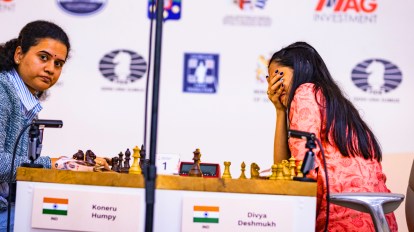In a landmark moment for Indian sports and chess, 19-year-old Divya Deshmukh etched her name in history by winning the FIDE Women’s Chess World Cup 2025 in Batumi, Georgia. Her stunning victory against seasoned champion Koneru Humpy, via tense tiebreaks after evenly matched classical games, crowned her the first Indian woman to ever claim this prestigious title. This achievement not only marks a significant personal milestone but signals the dawn of a new era in Indian chess, inspiring millions across the country.
Divya Deshmukh’s ascent to the pinnacle of women’s chess marks a pivotal shift in the Indian chess landscape, illustrating the country’s ability to nurture world-class talent from diverse regions. Originating from Nagpur, her journey challenges the traditional metropolitan dominance, revealing that dedication and opportunity combined can produce champions from all corners of India. This expands the narrative and motivates young players from smaller cities and towns to pursue chess seriously.
Her playing style, as observed throughout the World Cup, is characterized by a blend of aggressive tactics and meticulous endgame precision. This duality often confounds her opponents, who must prepare for relentless pressure coupled with sharp calculation. Analysts credit her ability to switch strategies mid-game and adapt swiftly to different opponents as a hallmark of elite players, making her a formidable contender on the global chess circuit.
The emotional intensity displayed during her matches—especially the final against Koneru Humpy—demonstrates a mature temperament uncommon among such young competitors. Managing nerves and maintaining focus under extreme pressure is crucial in top-tier chess, where a single miscalculation can alter the course of the game. Deshmukh’s consistency and composure during critical moments underpin her champions’ pedigree and hint at a promising future filled with resilience.
Her Grandmaster title is a milestone not just personally but symbolically for Indian women in chess. The achievement underscores progress toward gender parity in a sport historically dominated by men and inspires an expanding cohort of female players aiming for international recognition. As more women from India excel, the country’s position strengthens in global rankings, fostering a new wave of competitiveness internationally.
Divya’s success has led to increased media attention and public interest in chess, contributing to its social acceptance as a mainstream sport in India. This surge in popularity aids the establishment of more structured training academies, increased sponsorship, and improved infrastructure, creating a sustainable environment for the country’s next generation of talents to thrive.
Her leadership potential also shines through her team event performances, where she played pivotal roles in India’s gold medal triumphs. This ability to shine both individually and collectively reveals her well-roundedness as a player and competitor—qualities vital for future captaincy and mentoring roles within national chess teams.
A Breakthrough Win: The Journey to the Crown
Divya Deshmukh’s path to victory was a tale of grit and extraordinary skill. Seeded 15th in the tournament, she defied expectations by overcoming top-tier players, including World No. 2 Zhu Jiner, Harika Dronavalli, and Tan Zhongyi, showcasing her tactical brilliance and strategic depth. The final against Koneru Humpy—a chess great and India’s first woman Grandmaster—was a powerful contrast of youth versus experience. After two draws in classical matches, Divya seized the win in the rapid tiebreaks with composure and precision, securing a 2.5-1.5 aggregate score.
Her performance illuminated her rapid rise on the international stage and foreshadowed her potential to challenge for future World Championship titles.
Achieving Grandmaster Glory
Along with the World Cup title, Divya Deshmukh earned the coveted Grandmaster (GM) title—becoming only the fourth Indian woman after Humpy Koneru, Harika Dronavalli, and R Vaishali to reach this pinnacle. Unlike traditional pathways requiring multiple norms and high ratings, the victory granted her direct entry into the GM elite, underscoring the magnitude of her accomplishment in the chess world.
This Grandmaster status consolidates her position among the global elite and cements her legacy as a trailblazer for Indian women in chess.
Early Life and Rapid Ascent
Born in Nagpur to a family of doctors, Divya’s journey began early as her passion and talent for chess flourished. Her achievements have been meteoric: winning the 2022 Women’s Indian Chess Championship, earning an individual bronze at the 2022 Chess Olympiad, and helping India clinch gold in the 2020 Online Chess Olympiad team event.
In 2023, her domination was further established with a victory at the Asian Women’s Chess Championship and strong showings in rapid events like Tata Steel India. She has faced and defeated some of the toughest competition, including multiple victories against elite Indian grandmasters, placing her as a formidable force in world chess.

Beyond the Victory: Emotional and Inspirational Impact
Divya’s triumph was emotionally charged, with poignant moments illuminated by the presence of her mother and family who supported her relentlessly. The young champion’s humility stood out amidst the glory; she described the win as a new beginning rather than the culmination of her journey, sharing hopes to continue pushing boundaries and inspiring others.
Her inspiring story amplifies the narrative of determination and resilience, encouraging thousands of young talents in India to dream big.
Recent Outstanding Performances
Before her World Cup win, Divya showcased top form in the 2025 World Rapid and Blitz Team Chess Championships, besting the world’s top-ranked woman player Hou Yifan in a grueling battle. Her consistent high-level performances across formats attest to her versatility and mental strength—key traits for sustained success at the highest levels of chess.
Such achievements bolster her profile as an all-rounder, capable of adjusting strategy swiftly across time controls and opponents, much admired in global competitions.
India’s Chess Renaissance and Global Ambitions
Divya Deshmukh’s victory embodies India’s vibrant chess renaissance fueled by growing grassroots participation, improved training infrastructures, and international successes. Alongside legends like Viswanathan Anand and contemporary stars, she is pushing Indian chess onto the global forefront, particularly shining a light on the rising prominence of women players from the country.
Her success motivates stakeholders and young players alike, reinforcing that Indian chess is not only competitive globally but destined for even greater heights.
The wave of celebration following Divya Deshmukh’s World Cup victory is also evident in the growing chess communities online and across India’s coaching academies. Parents, coaches, and young dreamers are already discussing her games, strategies, and work ethic as models for aspiring talents. Educational institutions, too, are recognizing her as a role model, inviting her for workshops and inspiring talks that not only promote chess but also the values of persistence and strategic thinking in daily life.
Divya’s journey so far illustrates the profound impact of family support on individual achievement. Throughout her rise, her parents—both doctors—dedicated personal time and resources, moving across cities for tournaments and facilitating her access to the best coaching. Such backing, while often behind the scenes, is crucial in sports that demand early specialization and long hours of solitary preparation. She often credits her mother’s unwavering encouragement at critical junctures, highlighting the role of a robust support system in unlocking a young athlete’s potential.
The global chess fraternity’s response to her victory has been overwhelmingly positive. Messages of congratulations have poured in from international grandmasters, FIDE officials, and commentators—many hailing her as the next big hope for women’s chess worldwide. This recognition underscores not just her personal accomplishment but also the potential for Indian chess talent to reshape the international competitive landscape for years to come.

Looking Ahead: The Road to the Candidates and Beyond
With the Women’s Candidates Tournament 2026 qualification secured by this win, Divya is on the cusp of challenging for the Women’s World Chess Championship—a platform where legacies are forged, and India eagerly anticipates new laurels. Her focus on continued growth, learning, and competitive excellence promises exciting times ahead for the chess fraternity and fans.
This milestone victory, while historic, marks merely a stepping stone in a career that many anticipate will be decorated with further world titles and reverberate across Indian sport for generations.
Divya Deshmukh’s stunning victory at the FIDE Women’s Chess World Cup 2025 is more than a personal milestone—it is a beacon of India’s burgeoning dominance and promise on the world chess stage. Her journey from a prodigious teenager in Nagpur to a global champion and Grandmaster is a compelling narrative of passion, perseverance, and unparalleled skill, inspiring an entire nation and setting the foundation for future legends to emerge.
Mentored by some of India’s finest coaches and having access to cutting-edge training tools, Divya exemplifies how modern chess athletes leverage technology, video analysis, and data analytics to refine their skills. The integration of traditional wisdom with tech-enabled preparation has become standard in elite chess circles, and Deshmukh’s rise demonstrates its effectiveness in the Indian context.
Her trajectory is emblematic of India’s evolving sporting ethos, where disciplined grassroot initiatives and talent scouting coexist with emerging professionalism. The government and private entities’ growing investment in sports infrastructure and athlete development programs have created viable career pathways for aspirants, significantly influencing India’s presence on the global sports stage.
Looking ahead, Divya Deshmukh’s involvement in the upcoming Women’s Candidates Tournament will be closely watched as a crucial proving ground. Her performance there could redefine the Indian chess narrative even further, potentially paving the way for her challenge at the World Championship level and inspiring deeper engagement from sponsors, media, and the public.
Finally, the cultural significance of her victory resonates beyond the chessboard. In an era striving for equal representation and empowerment in sports, Deshmukh’s breakthrough symbolizes broader social progress, motivating women across disciplines to strive for excellence and break barriers. Her story, encapsulated by hard work, humility, and historic success, stands as a powerful testament to the transformative potential of sports.
follow: FIDE
Also read: Mumbai-Pune Expressway Tragedy: 1 Dead, 18 Injured in Massive 20-Vehicle Pile-Up Near Khopoli

